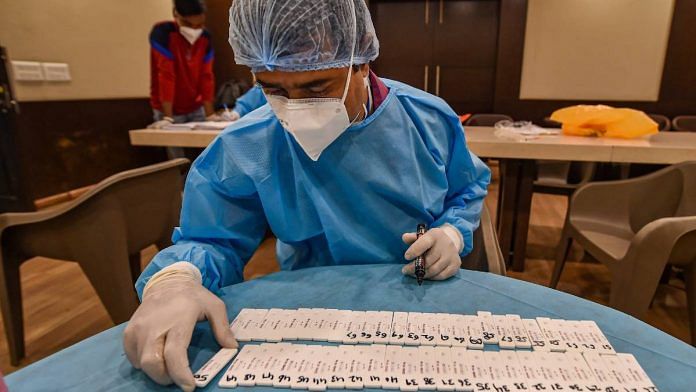New Delhi: Machine algorithms can help determine the severity outcome of Covid-19 mutations with an accuracy of 87 per cent, scientists from the Semmelweis University and the Pazmany Peter Catholic University have found in a new study.
The goal of the study was to statistically link mutations to severe disease outcome. “Our goal was to establish whether or not the mutation signatures can distinguish two input classes, i.e., mild and severe patient outcomes,” states the study titled ‘COVIDOUTCOME — Estimating COVID Severity Based on Mutation Signatures in the SARS-CoV-2 Genome’.
A preprint was made available Friday on the website of bioRxiv, a site operated by US-based Cold Spring Harbor Laboratory for scientists to get their studies peer reviewed.
Also read: Artificial Intelligence could fight a future coronavirus
Focus of the study
Yet to be peer reviewed, the study poses the question whether mutation signature of the virus can be used as an indicator of the severity of the disease. In its findings, the study notes, “We identified 26 protein and UTR mutations significantly linked to severe outcomes. The best classification algorithm uses a mutation signature of 22 mutations as well as the patient’s age as the input and shows high classification efficiency with an AUC of 0.94 and a prediction accuracy of 87%.”
AUC or area under the curve refers to the performance measurement tool used in machine learning. It is an evaluation metric for checking any classification model’s performance.
Untranslated region or UTR refers to either of two sections, one on each side of a coding sequence on a strand of messenger RNA (mRNA), a single-stranded ribonucleic acid (RNA) molecule that is complementary to one of the DNA strands of a gene.
“We used an automated machine learning approach where 1,594 viral genomes with available clinical follow-up data were used as the training set (797 severe and 797 mild),” the study said of its methodology.
This means 1,594 viral genomes were used as a data bank where 797 of the genomes were identified as those with severe disease outcomes and the other half with mild disease outcomes.
The study used machine learning techniques to select mutation signatures associated with severe SARS-CoV-2 infections. The researchers found that artificial intelligence was an effective tool “for uncovering hidden associations in large datasets”.
The researcher also created an online platform called Covid Outcome, which is capable of using a viral sequence and the patient’s age as the input and provides a percentage estimation of disease severity.
The study was funded by the Hungarian Ministry for Innovation and Technology (MIT) , within the framework of the Bionic thematic programme of the Semmelweis University.
(Edited by Manasa Mohan)
Also read: Covid could have been AI’s moment in sun. But it isn’t as flexible as humans yet



